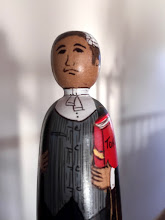Bob’s confusion did
not return until his seventy-fifth year. But when it did it stayed with
him and Merle for the rest of their days together.
 Initially Bob’s mix-ups and muddles went un-named. The children were the first to label their father’s
condition. They called it ‘SOBS’ or ‘Silly Old Bugger Syndrome’. They called it
this even after the medical profession had adjudged the symptoms and passed
sentence. ‘Alzimers’.
Initially Bob’s mix-ups and muddles went un-named. The children were the first to label their father’s
condition. They called it ‘SOBS’ or ‘Silly Old Bugger Syndrome’. They called it
this even after the medical profession had adjudged the symptoms and passed
sentence. ‘Alzimers’.
Then came the
new medications and the management and Merle was able to cope. She was lucky,
in a way, Bob’s dementia was mild and mercifully slow to progress. Even at the
end he recognised his wife though his familiarity with the children had faded
and the grandchildren were just a bunch of happy little strangers who visited
from time to time.
‘They the neighbour’s
kids?’ he would sometimes say, when he still had words to ask. But the advance,
though slow, was relentless and in the last year he struggled more and more for
words and thoughts. As his words deserting him so too did any sense of
wellbeing and calm. He was unable to make much sense of what he read and was
losing the words for common things. Merle knew that a sad new phase had
commenced the morning he went to retrieve the paper and returned with a wheel
spanner.
The nights especially
were a burden. Merle’s mango tree towered above the house now. Her son’s had
trimmed the branches overhanging the roof but still a flying fox on the wing
would drop one of the green fruits onto the roof. Bob was profoundly disturbed
by the bombardment or by the sound of possums screeching and bounding across
the iron. For him the sounds took were inexplicably sinister. Many summer
nights Merle would find her husband on the veranda outside their bedroom. He
would be sitting in one of the cane chairs rolling mangoes towards the long
abandoned chicken run below. She would lead him back to bed mumbling. He would
sometimes insist on carrying one of the fruit with him.
‘My bomb’ he
would call it. Till recently she had been strong enough to take the fruit from
him and coax him to bed with gentle assurances that all was well. But with her
own failing strength this had not always been possible so she would leave him
to return in his own time.
She knew that
the habits he adopted came from the war. Beyond that, she knew little. His
recollection of their earliest life remained intact as the present receded from
his grasp. But he spoke sparingly of the war and all she had to contemplate was
what she knew of history and the box of letters he had sent her from New Guinea.
She had contemplated
them more than once: dragging the cardboard suitcase from the cupboard, opening
the cash tin of letters and reading them. She never read them to Bob; whatever
recollection he had of the war was already too much. But she did read him the
letters he had sent when he travelled as relieving manger to rural banks
throughout the state. She showed him the photographs of their early years, the
house and the children. And she showed him the carved coconut he had won her
and she had kept. It was dusty and grey and tattered but still intact. He
always smiled when she pulled the monkey face out of the biscuit tin. He would
point to the broken toothy grin and they would laugh and hold hands and he
would say ‘The Ekka’. He would sometimes repeat the word like an incantation,
as if that would break the viscous spell that bound him. She would read the letters
from the war in secret and in silence but there was little to illuminate his
demons. They were unfailingly bold. Riddled with references to ‘the Jap’ and
‘this row’ and the heat and rain and the fuzzy wuzzy and how well they were all
doing.
To be continued:
Next time, Merle reads her husband’s letter to her, the one she has never read before, and finally she understands.


No comments:
Post a Comment